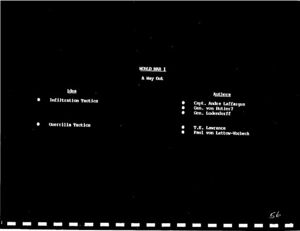Patterns of Conflict
| The works of |
| Works of John Boyd |
|---|
OODA WIKI Edition
Quantico Transcription
Okay. What happened? Eventually some people started thinking about that, in fact early on, and the so-called birth of which led to our modern tactics today. There was initially a French captain by the name of Andre Laffargue, who in 1915 said hey, this is a hopeless way of doing business. So he envisioned small units leaking through the enemy lines. He didn’t have it all right.
The Germans captured some of those pamphlets, and then they augmented it even more. And eventually, of course, it was used against the West in 1918, so-called German infiltration techniques. Today they’re known— some people call them Hutier Tactics.
That’s why I put a question mark after him, because he was not an architect. He just happened to be commander on the German side that used them, and either a French or English correspondent used that name. And ever since then, it’s been called the Hutier Tactics. But he wasn’t an architect. That’s why I’ve got the question mark. But he was a commander [unintelligible].
And the guy at a higher level that understood the importance was Ludendorff. When he saw what they had, he said okay, let’s really train and do this technique. So from a supreme commander or high level commander, he didn’t understand the [unintelligible]. He did appreciate the
significance and [unintelligible]. We’re going to talk about that in just a minute.
And in the guerrilla front seen through Peter O’Toole, you know, Lawrence of Arabia. Some of you people saw that movie, Lawrence of Arabia. And he saw a way of getting at the guerrilla tactics. Also, there was another gentleman by the name of Lettow-Vorbeck down in German East Africa. Anybody read about his exploits down in German East Africa?
In many ways, he was an even better guerrilla fighter than Lawrence because he was totally cut off, literally living on British supplies and causing them enormous problems. And as a matter of fact, he surrendered after Germany did during World War I. In fact, he wasn’t going to surrender because he didn’t believe them. The British told him that Germany surrendered. He said, “no, no, you're trying to just get me to give up my force.” It took a lot of convincing.
He was stronger at the end than he was at the beginning. Not only that, you know what he did, early on against the British and the troops down there. He won an early battle. Note the word “battle.” He said boy, another one of these victories, I won’t have any force left. He said, I can’t afford these kind of victories. So he got away and started playing very just— subversion, guerrilla warfare game, very small unit actions. Because he said if I lose my force, I’m out of business. He was greatly outnumbered.
Audience: Where did you say he was operating?
Boyd: German East Africa. He surrendered. The beautiful thing is, he surrendered after Germany during World War I. He was stronger at the end than he was at the beginning. And he was living off British supplies. Classic guerrilla tactics. In other words, living off the other guy’s logistics effort, so to speak.
He caused an enormous problem, and he was only a colonel. And he was going up against like 20 or 30 British generals. He made them all look like fools. They always came up with a new plan, they’re going to eradicate, they liked that word. And they all fell. They all went down the drain.
